英语句型
35个经典英语句型

ããåãAdj + as + Subject(主è¯)+ be, S + V~~~ (è½ç ¶......)
ãã ä¾ å ¥ï¼Rich as our country is, the qualities of our living are by no means satisfactory. {by no means = in no way = on no accountä¸ ç ¹ä¹ ä¸}
ããåå «ãbe + forced/compelled/obliged + to + V (ä¸ å¾ ä¸......)
ãã ä¾ å ¥ï¼Since the examination is around the corner, I am compelled to give up doing sports.
ãã å¼ è å¸ æ¯ææ ¾ç» é å °æ ä» æ ç æ å¸ ã
ããäºãNothing is + ~~~ er than to + V
ããNothing is + more +形容è¯+ than to + V
ãã ä¾ å ¥ï¼Nothing is more important than to receive education.
ãã ä¾ å ¥ï¼It pays to help others.
ãã å¸®å ©å «äººæ ¯å ¼å¾ ç ã
ããäºå å ãbe based on (以......ä¸ºå ºç¡)
英语句型大全
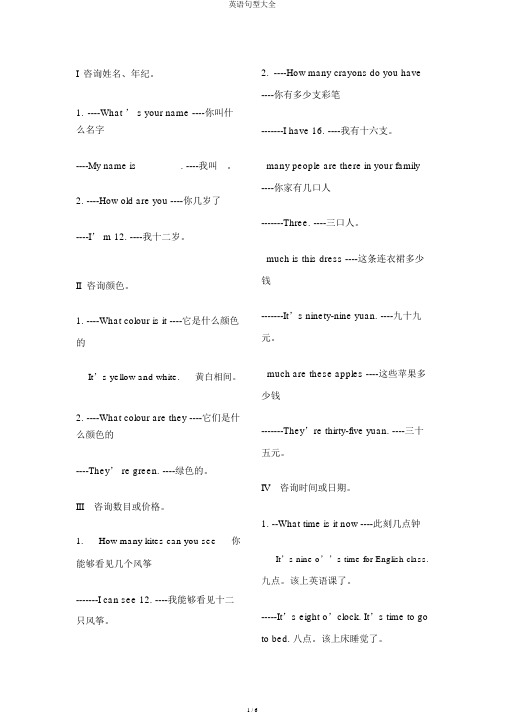
I咨询姓名、年纪。
1.----What ’ s your name ----你叫什么名字----My name is ________. ----我叫。
2. ----How old are you ----你几岁了----I’ m 12. ----我十二岁。
II咨询颜色。
1.----What colour is it ----它是什么颜色的----It’s yellow and white. ----黄白相间。
2.----What colour are they ----它们是什么颜色的----They’ re green. ----绿色的。
III咨询数目或价格。
1.----How many kites can you see ----你能够看见几个风筝-------I can see 12. ----我能够看见十二只风筝。
2.----How many crayons do you have ----你有多少支彩笔-------I have 16. ----我有十六支。
many people are there in your family ----你家有几口人-------Three. ----三口人。
much is this dress ----这条连衣裙多少钱-------It’s ninety-nine yuan. ----九十九元。
much are these apples ----这些苹果多少钱-------They’re thirty-five yuan. ----三十五元。
IV咨询时间或日期。
1. --What time is it now ----此刻几点钟-----It’s nine o’’s time for English class.九点。
该上英语课了。
-----It’s eight o’clock. It’s time to go to bed. 八点。
该上床睡觉了。
英语最常用的60个句型及例句
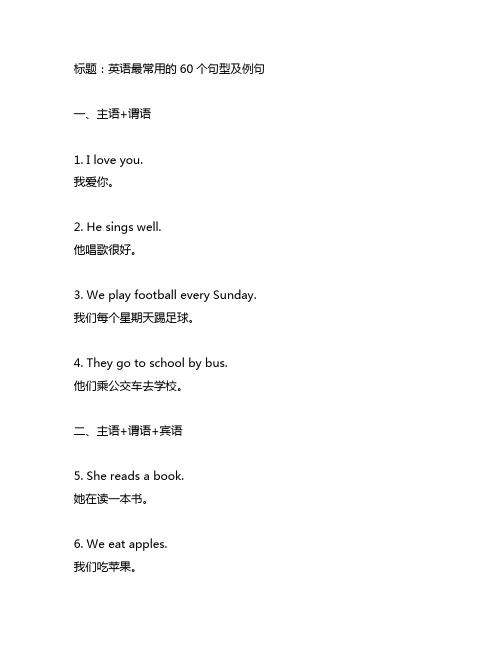
标题:英语最常用的60个句型及例句一、主语+谓语1. I love you.我爱你。
2. He sings well.他唱歌很好。
3. We play football every Sunday. 我们每个星期天踢足球。
4. They go to school by bus.他们乘公交车去学校。
二、主语+谓语+宾语5. She reads a book.她在读一本书。
6. We eat apples.我们吃苹果。
7. He speaks English.他讲英语。
8. They watch TV.他们看电视。
三、主语+谓语+宾语+宾语补足语9. She paints the wall red.她把墙刷成了红色。
10. We call him a hero.我们称他为英雄。
11. He considers the plan unfeasible. 他认为这个计划不可行。
12. They make their father proud.他们让父亲感到自豪。
四、主语+系动词+表语13. I am a teacher.我是一名老师。
14. She was happy.她很快乐。
15. He is my friend.他是我的朋友。
16. They are students.他们是学生。
五、主语+谓语+间宾+直宾17. She teaches us English. 她教我们英语。
18. He bought her a gift. 他给她买了一份礼物。
19. We tell him a story.我们给他讲故事。
20. They show us the way.他们给我们指路。
六、主语+谓语+宾补+宾语21. She made her sister cry.她让她妹妹哭了。
22. They found the problem solved. 他们发现问题已经解决了。
23. He heard the news spread.他听说了消息已经传开了。
英语八大常用句型
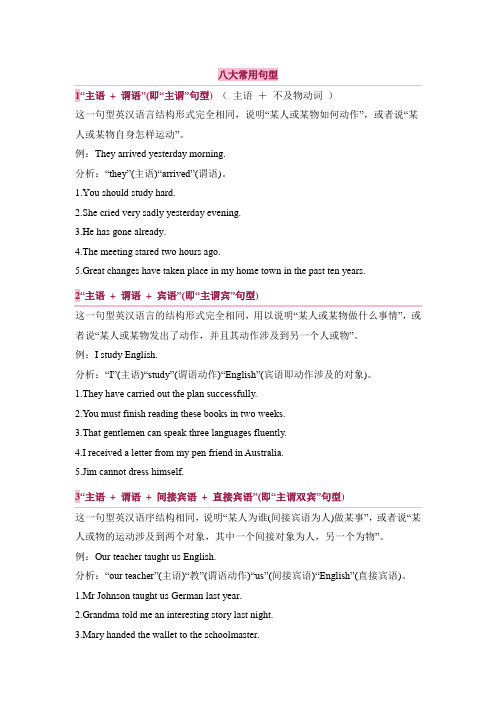
八大常用句型1“主语+ 谓语”(即“主谓”句型) (主语+不及物动词)这一句型英汉语言结构形式完全相同,说明“某人或某物如何动作”,或者说“某人或某物自身怎样运动”。
例:They arrived yesterday morning.分析:“they”(主语)“arrived”(谓语)。
1.You should study hard.2.She cried very sadly yesterday evening.3.He has gone already.4.The meeting stared two hours ago.5.Great changes have taken place in my home town in the past ten years.2“主语+ 谓语+ 宾语”(即“主谓宾”句型)这一句型英汉语言的结构形式完全相同,用以说明“某人或某物做什么事情”,或者说“某人或某物发出了动作,并且其动作涉及到另一个人或物”。
例:I study English.分析:“I”(主语)“study”(谓语动作)“English”(宾语即动作涉及的对象)。
1.They have carried out the plan successfully.2.You must finish reading these books in two weeks.3.That gentlemen can speak three languages fluently.4.I received a letter from my pen friend in Australia.5.Jim cannot dress himself.3“主语+ 谓语+ 间接宾语+ 直接宾语”(即“主谓双宾”句型)这一句型英汉语序结构相同,说明“某人为谁(间接宾语为人)做某事”,或者说“某人或物的运动涉及到两个对象,其中一个间接对象为人,另一个为物”。
英语常用句型100句

英语常用句型100句1. It's a pleasure to meet you. (很高兴见到你。
)2. How are you? (你好吗?)3. What's your name? (你叫什么名字?)4. Where are you from? (你来自哪里?)5. How old are you? (你多大了?)6. Can you speak English? (你会说英语吗?)7. What do you do for a living? (你的职业是什么?)8. How do you spell that? (你怎么拼写那个?)9. What is your favorite food? (你最喜欢的食物是什么?)10. Where do you live? (你住在哪里?)11. What time is it? (现在几点了?)12. Can you help me? (你能帮助我吗?)13. I don't understand. (我不明白。
)14. Could you please repeat that? (你能再重复一遍吗?)15. How much does it cost? (这个多少钱?)16. Where is the nearest bank? (最近的银行在哪里?)17. What's the weather like today? (今天天气怎么样?)18. I'm sorry. (对不起。
)19. Excuse me. (打扰一下。
)20. Do you have any questions? (你有什么问题吗?)21. Nice to meet you. (很高兴认识你。
)22. How do you do? (你好。
)23. What do you think? (你觉得怎么样?)24. Can I help you? (我能帮你吗?)25. What's your favorite color? (你最喜欢的颜色是什么?)26. Where are you going? (你要去哪里?)27. What do you want to do? (你想做什么?)28. How was your day? (你今天过得怎么样?)29. Can you show me on the map? (你能在地图上给我看吗?)30. What's your phone number? (你的电话号码是多少?)31. How long have you been learning English? (你学英语学了多久了?)32. How far is it from here? (离这里有多远?)33. What's your favorite movie? (你最喜欢的电影是什么?)34. Do you have any siblings? (你有兄弟姐妹吗?)35. What's your favorite book? (你最喜欢的书是什么?)36. What's your favorite sport? (你最喜欢的运动是什么?)37. Can I have a glass of water, please? (请给我一杯水。
英语的句型句式大全
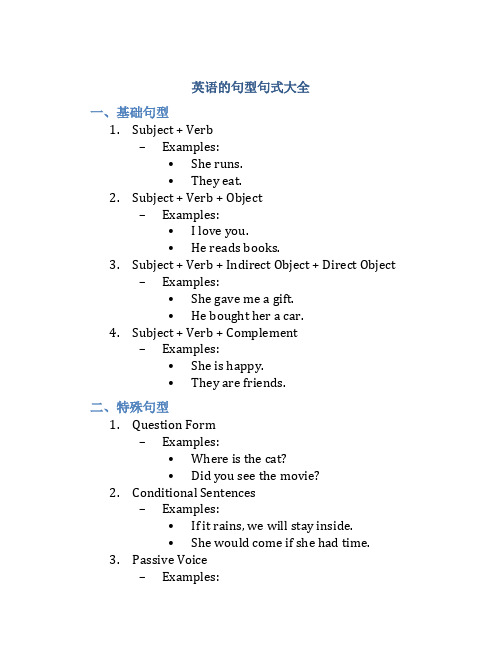
英语的句型句式大全一、基础句型1.Subject + Verb–Examples:•She runs.•They eat.2.Subject + Verb + Object–Examples:•I love you.•He reads books.3.Subject + Verb + Indirect Object + Direct Object–Examples:•She gave me a gift.•He bought her a car.4.Subject + Verb + Complement–Examples:•She is happy.•They are friends.二、特殊句型1.Question Form–Examples:•Where is the cat?•Did you see the movie?2.Conditional Sentences–Examples:•If it rains, we will stay inside.•She would come if she had time.3.Passive Voice–Examples:•The book was written by the author.•The cake was eaten by the children.三、复杂句式1.Relative Clauses–Examples:•The boy who is wearing a red shirt is my brother.•The book that I borrowed from the library is interesting.2.Coordinating Conjunctions–Examples:•I want both the cake and the ice cream.•He is not only smart but also kind.3.Subordinating Conjunctions–Examples:•Although it was raining, we went out.•She will come when she finishes work.四、强调句型1.It is/was + Adjective + that/who + Subject + Verb–Example:•It was Mary who won the competition.2.Subject + Verb + what/who/which + Object + Verb–Example:•I saw what you did.五、形容词和副词的句型1.Adjective + Noun–Examples:•Beautiful flowers•Fast car2.Adverb + Verb–Examples:•Quickly run•Carefully readparative and Superlative Forms–Examples:•He is taller than his brother.•She is the smartest in the class.六、感叹句型1.What + Noun + Subject + Verb!–Example:•What a beautiful day it is!2.How + Adjective/Adverb + Subject + Verb!–Example:•How quickly he runs!以上是英语中常见的句型句式,掌握这些基础句型和特殊句型可以帮助提升英语表达能力,丰富句子结构,让语言更加生动自然。
(完整版)英语句型大全
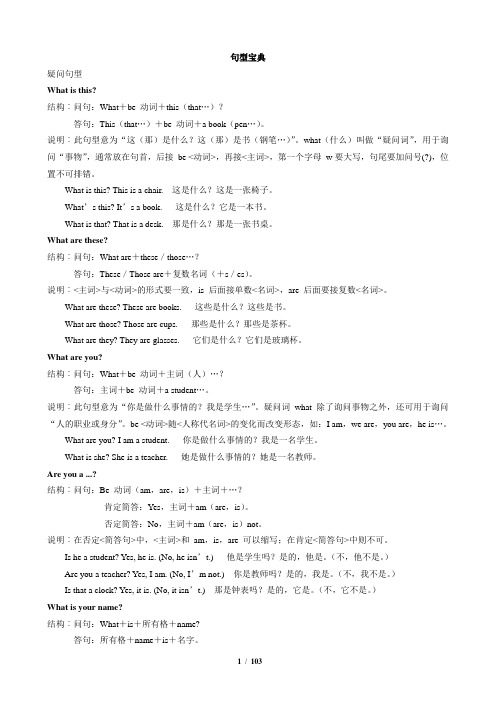
句型宝典疑问句型What is this?结构︰问句:What+be 动词+this(that…)?答句:This(that…)+be 动词+a book(pen…)。
说明︰此句型意为“这(那)是什么?这(那)是书(钢笔…)”。
what(什么)叫做“疑问词”,用于询问“事物”,通常放在句首,后接be <动词>,再接<主词>,第一个字母w要大写,句尾要加问号(?),位置不可排错。
What is this? This is a chair. 这是什么?这是一张椅子。
What’s this? It’s a book. 这是什么?它是一本书。
What is that? That is a desk. 那是什么?那是一张书桌。
What are these?结构︰问句:What are+these/those…?答句:These/Those are+复数名词(+s/es)。
说明︰<主词>与<动词>的形式要一致,is 后面接单数<名词>,are 后面要接复数<名词>。
What are these? These are books. 这些是什么?这些是书。
What are those? Those are cups. 那些是什么?那些是茶杯。
What are they? They are glasses. 它们是什么?它们是玻璃杯。
What are you?结构︰问句:What+be 动词+主词(人)…?答句:主词+be 动词+a student…。
说明︰此句型意为“你是做什么事情的?我是学生…”。
疑问词what 除了询问事物之外,还可用于询问“人的职业或身分”。
be <动词>随<人称代名词>的变化而改变形态,如:I am,we are,you are,he is…。
What are you? I am a student. 你是做什么事情的?我是一名学生。
100个英语模板句型

100个英语模板句型1. want to do sth 想做某事2. want …… to do sth 想让某人做某事3. be different from 与……不同4. be the same as 与……相同5. be friendly to ……对某人友好6. welcome to ……欢迎来到某地7. What’s the matter with ……/sth?某人/某物出什么毛病了?8. what to do 做什么9. let …… do sth 让某人做某事10. let …… not do sth 让某人不做某事11. why don’t you do sth?你怎么不做某事呢?12. why not do sth?怎么不做某事呢?13. make …… sth 为某人制造某物14. make sth for ……为某人制造某物15. What do you mean by doing sth?你做……是什么意思?16. like doing sth 喜爱做某事17. like to do sth 想去做某事18. feel like doing sth 想要做某事19. would like to do sth 想要做某事20. would like …… to do sth 想要某人做某事21. make …… do sth 使某人做某事22. let …… do sth 让某人做某事23. have …… do sth 使某人做某事24. be far from ……离某地远25. be near to ……离某地近26. be good at sth/doing sth 擅长某事/做某事27. It takes …… some time to do sth 做某事花费某人多长时间28. ……ends some time/money (in )doing sth 某人花一些时间/钱做某事29. …………ends some time/money on sth 某人花一些时间/钱在某事/物上30. sth costs …… some money 某物花了某人一些钱31. …… pays some money for sth 某人为某物付了一些钱32. begin/start sth with sth 伴随……开始做某事33. be going to do sth 打算做某事34. call A B 叫A B35. thank …… for sth/doing sth 感谢某人做某事36. What……for?为什么?37. How/ what about doing sth?做某事怎么样?38. S +be+ the+最高级+of/in短语39. S + be +比较级+than any other + n40. have to do sth 不得不/必须做某事41. had better do sth 最好做某事42. had better not do sth 最好别做某事43. help …… to do sth 帮助某人做某事44. help …… do st 帮助某人做某事45. help …… with sth 帮助某人做某事46. make it +时间把时间定在……47. take …… to ……带某人到某地49. have nothing to do (with ……)与某人没有关系50. 主语+ don’t think + 从句……认为……不……51. It’s + adj + for …… to do sth 做某事对某人来说怎么样52. How + adj/adv + 主+ 谓!……多么…...啊!53. what + a/an + adj + [c] + 主+ 谓!54. What + adj+ pl/[u] +主+ 谓!55. find it + adj + to do sth 发现做某事如何56. ask …… for sth 向某人要某物57. need to do sth 需要做某事58. need sth 需要某物59. use sth to do sth 用某物来做某事60. show …… sth 给某人看某物61. show sth to ……把某物给某人看62. pass …… sth 把某物递给某人63. pass sth to ……把某物递给某人64. buy …… sth 为某人买某物65. buy sth for ……为某人买某物66. give …… sth 把某物给某人67. give sth to ……把某物给某人68. get to ……达到某地69. arrive at/in ……达到某地70. reach ……达到某地71. hope to do sth 希望某人做某事72. there is sth wrong with sth/……某物/某人出毛病了73. sth is wrong with……某物出毛病了74. How do you like sth?你认为……怎么样?75.What do you think of sth?你认为……怎么样?76. start doing sth 开始做某事77. start to do sth 开始做某事78. finish doing sth 完成做某事79. enjoy doing sth 喜欢做某事80. what else……别的什么81. forget doing sth 忘记做过某事(已做)82. forget to do sth 忘了做某事(未做)83. remember doing sth 记得做过某事(已做)84. remember to do sth 记住做某事(未做)85. stop to do sth 停下来去做另一件事86. stop doing sth 停止正在做的事87. watch/see/hear …… do sth 观看/看见/听见某人做了某事88. watch/see/hear …… doing sth 观看/看见/听见某人在做某事89. go on doing sth 继续做同一件事90. go on to do sth 继续做另一件事91. go on with sth 继续某事He went on with his work after a short rest.在短暂的休息后,他继续他的工作。
简单英语句型30个
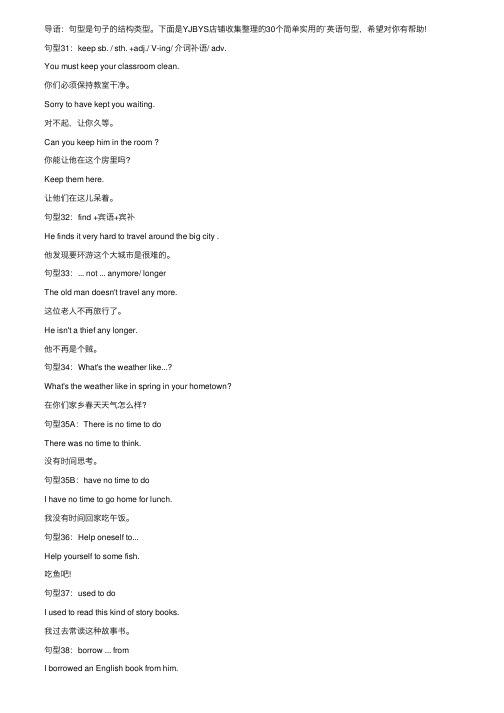
导语:句型是句⼦的结构类型。
下⾯是YJBYS店铺收集整理的30个简单实⽤的`英语句型,希望对你有帮助! 句型31:keep sb. / sth. +adj./ V-ing/ 介词补语/ adv. You must keep your classroom clean. 你们必须保持教室⼲净。
Sorry to have kept you waiting. 对不起,让你久等。
Can you keep him in the room ? 你能让他在这个房⾥吗? Keep them here. 让他们在这⼉呆着。
句型32:find +宾语+宾补 He finds it very hard to travel around the big city . 他发现要环游这个⼤城市是很难的。
句型33:... not ... anymore/ longer The old man doesn't travel any more. 这位⽼⼈不再旅⾏了。
He isn't a thief any longer. 他不再是个贼。
句型34:What's the weather like...? What's the weather like in spring in your hometown? 在你们家乡春天天⽓怎么样? 句型35A:There is no time to do There was no time to think. 没有时间思考。
句型35B:have no time to do I have no time to go home for lunch. 我没有时间回家吃午饭。
句型36:Help oneself to... Help yourself to some fish. 吃鱼吧! 句型37:used to do I used to read this kind of story books. 我过去常读这种故事书。
英语十大基本句型
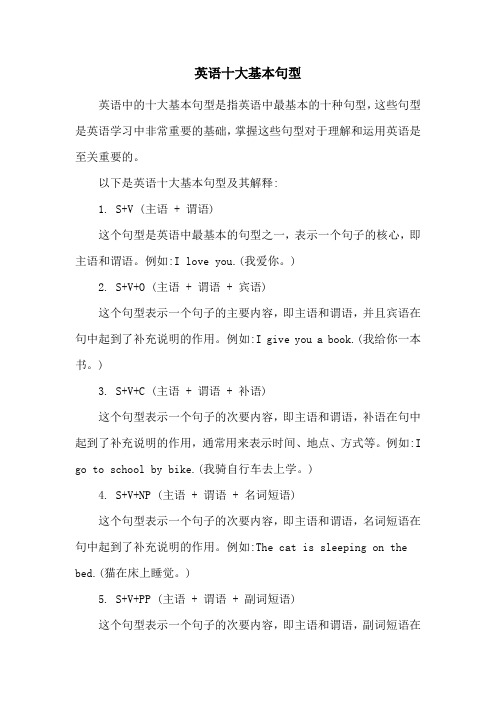
英语十大基本句型英语中的十大基本句型是指英语中最基本的十种句型,这些句型是英语学习中非常重要的基础,掌握这些句型对于理解和运用英语是至关重要的。
以下是英语十大基本句型及其解释:1. S+V (主语 + 谓语)这个句型是英语中最基本的句型之一,表示一个句子的核心,即主语和谓语。
例如:I love you.(我爱你。
)2. S+V+O (主语 + 谓语 + 宾语)这个句型表示一个句子的主要内容,即主语和谓语,并且宾语在句中起到了补充说明的作用。
例如:I give you a book.(我给你一本书。
)3. S+V+C (主语 + 谓语 + 补语)这个句型表示一个句子的次要内容,即主语和谓语,补语在句中起到了补充说明的作用,通常用来表示时间、地点、方式等。
例如:I go to school by bike.(我骑自行车去上学。
)4. S+V+NP (主语 + 谓语 + 名词短语)这个句型表示一个句子的次要内容,即主语和谓语,名词短语在句中起到了补充说明的作用。
例如:The cat is sleeping on the bed.(猫在床上睡觉。
)5. S+V+PP (主语 + 谓语 + 副词短语)这个句型表示一个句子的次要内容,即主语和谓语,副词短语在句中起到了补充说明的作用。
例如:The sun is shining brightly.(太阳正在明媚地照耀。
)6. S+V+OC (主语 + 谓语 + 宾语 + 补语)这个句型表示一个句子的主要内容,即主语和谓语,宾语和补语在句中起到了补充说明的作用。
例如:I see a cat jumping over the fence.(我看见一只猫跃过篱笆。
)7. S+V+CC (主语 + 谓语 + 补语 + 宾语)这个句型表示一个句子的主要内容,即主语和谓语,宾语在句中起到了补充说明的作用,而补语则起到了强调的作用。
例如:I love you, that"s all.(我爱你,就这些。
100个英语句型
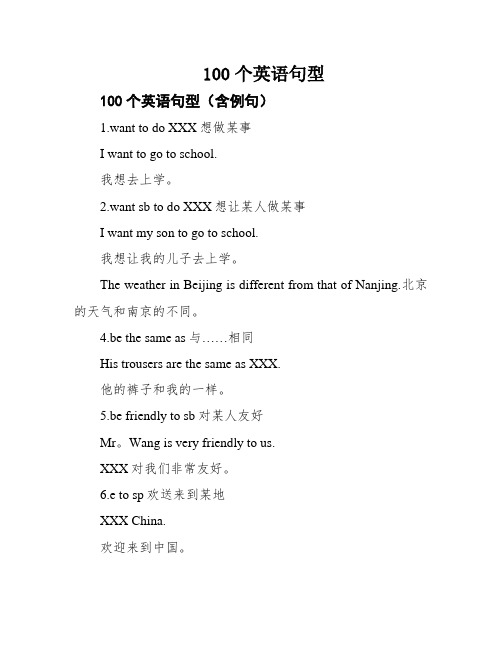
100个英语句型100个英语句型(含例句)1.want to do XXX想做某事I want to go to school.我想去上学。
2.want sb to do XXX想让某人做某事I want my son to go to school.我想让我的儿子去上学。
The weather in Beijing is different from that of Nanjing.北京的天气和南京的不同。
4.be the same as与……相同His trousers are the same as XXX.他的裤子和我的一样。
5.be friendly to sb对某人友好Mr。
Wang is very friendly to us.XXX对我们非常友好。
6.e to sp欢送来到某地XXX China.欢迎来到中国。
7.XXX?或人/某物出甚么弊端了?What’s the matter with your watch?你的手表怎么了?8.what to do做什么We don’t know what to do next.我们不晓得接下来要做甚么。
9.let sb do XXX让或人做某事Let him enter the room.让他进入房间。
10.let sb not do XXX让某人不做某事Let him not stand in the rain.让他不要站在雨中。
11.why don’t you do sth?你怎样不做某事呢?Why don’t you play football with us?你怎么不和我们踢足球呢?12.why not do sth?怎么不做某事呢?Why not play football with us?为甚么反面我们踢足球呢?13.make XXX为某人制造某物XXX.我爸爸给我做了一个风筝。
14.make sth for sb为或人制造某物XXX.我爸爸给我做了一个风筝。
英语五种基本句型

1、“主语 + 谓语”(即“主谓”句型)
这一句型英汉语言结构形式完全相同,说明“某人或某 物如何动作”,或者说“某人或某物自身怎样运动”。
例:They arrived in Harbin yesterday morning. 分析:“they”(主语)“arrived”(谓语)。
2、“主语 + 谓语 + 宾语”(即“主谓宾”句型)
GOOD BYE!
5、“主语 + 系动词+ 表语”(即“主系表”句型)
这一句型用以说明“某人(某物、某事、某种概念)具有什么 特征或处于什么状态”。汉语的“是”字结构属于这一英语 句型的形式之一。常用的系动词有be, keep,lie, remain, stand, become, fall, get, go, grow, turn, look, feel, seem, smell, sound, taste, 等。 例:I am a teacher. 我是一名老师 分析:“I”(主语)“am”(系动词)“a teacher”(表语—即 表明主语的身份)。。
这一句型英汉语言的结构形式完全相同,用以说明“某人 或某物做什么事情”,或者说“某人或某物发出了动作, 并且其动作涉及到另一个人或物”。 例:I study English. 分析:“I”(主语)“study”(谓语动作)“English”(宾语 即动作涉及的对象)。
3、“主语 + 谓语 + 间接宾语 + 直接宾语”(即“主谓双宾”句型)
4、“主语 + 谓语 + 宾语 + 宾语补足语”(即“主谓宾宾补”句型)
这一句型说明“某人或某物要求(使、让)某人做什么”或“某 人感觉某人或物怎么样”。 例:He asked her to go there. 分析:“he”(主语)“asked”(谓语动作)“her”(宾语即动 作涉及的对象)“to go theHale Waihona Puke e”(补语--补充说明宾语做什么)。
常见的45个英语句型
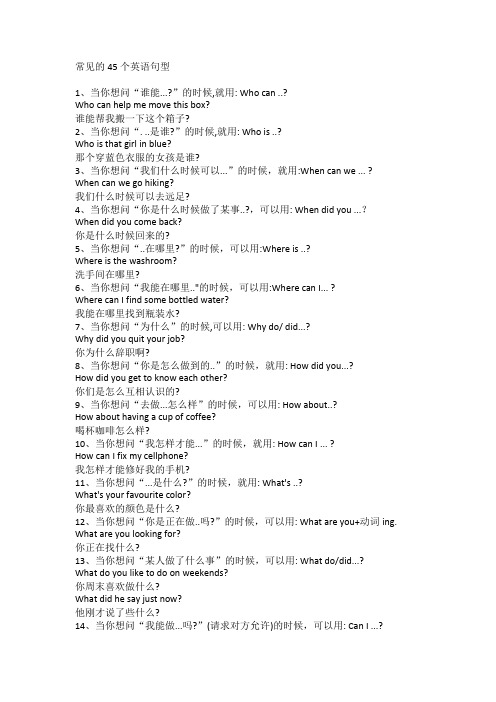
常见的45个英语句型1、当你想问“谁能...?”的时候,就用: Who can ..?Who can help me move this box?谁能帮我搬一下这个箱子?2、当你想问“. ..是谁?”的时候,就用: Who is ..?Who is that girl in blue?那个穿蓝色衣服的女孩是谁?3、当你想问“我们什么时候可以...”的时候,就用:When can we ... ? When can we go hiking?我们什么时候可以去远足?4、当你想问“你是什么时候做了某事..?,可以用: When did you ...?When did you come back?你是什么时候回来的?5、当你想问“..在哪里?”的时候,可以用:Where is ..?Where is the washroom?洗手间在哪里?6、当你想问“我能在哪里.."的时候,可以用:Where can I... ?Where can I find some bottled water?我能在哪里找到瓶装水?7、当你想问“为什么”的时候,可以用: Why do/ did...?Why did you quit your job?你为什么辞职啊?8、当你想问“你是怎么做到的..”的时候,就用: How did you...?How did you get to know each other?你们是怎么互相认识的?9、当你想问“去做...怎么样”的时候,可以用: How about..?How about having a cup of coffee?喝杯咖啡怎么样?10、当你想问“我怎样才能...”的时候,就用: How can I ... ?How can I fix my cellphone?我怎样才能修好我的手机?11、当你想问“...是什么?”的时候,就用: What's ..?What's your favourite color?你最喜欢的颜色是什么?12、当你想问“你是正在做..吗?”的时候,可以用: What are you+动词ing. What are you looking for?你正在找什么?13、当你想问“某人做了什么事”的时候,可以用: What do/did...?What do you like to do on weekends?你周末喜欢做什么?What did he say just now?他刚才说了些什么?14、当你想问“我能做...吗?”(请求对方允许)的时候,可以用: Can I ...?Can I take a look at your notebook?我能看一下你的笔记本吗?15、当你想问“你能做... 吗?”,提出请求的时候,可以用: Could you/Would you...? Could you tell me what time the store is open?你能告诉我这家店几点营业吗?16、当你想问“你是...吗?”的时候,就用: Are you...?Are you Mr. Brown?你是布朗先生吗?Are you making dinner now?你现在是在做晚饭吗?17、除此之外,问对方很多其他情况,都可以用: Doyou+动词...Do you need any help?你需要帮助吗?Do you mind if I open the window?你介意我打开窗户吗?18、当你想要问“你是否(已经)做了某件事”的时候,可以用: Have you ..? Have you seen the message I sent you?你(已经)看到我发给你的信息了吗?19、当你想问某事物的情况的时候, 可以用: Is it ..?Is it close to your house?那离你家近吗?20、当你想陈述自己的情况和观点的时候,可以用: I'm (not)+形容词/名词I'm good at dancing.我擅长跳舞。
英语句型大全
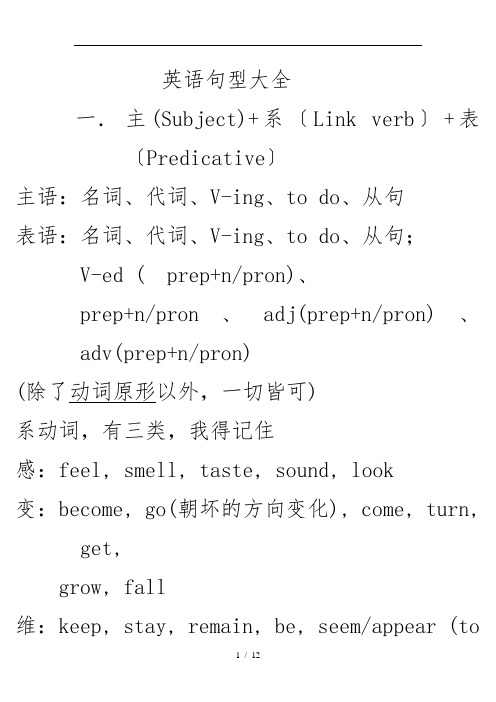
英语句型大全一.主(Subject)+系〔Link verb〕+表〔Predicative〕主语:名词、代词、V-ing、to do、从句表语:名词、代词、V-ing、to do、从句;V-ed ( prep+n/pron)、prep+n/pron、adj(prep+n/pron)、adv(prep+n/pron)(除了动词原形以外,一切皆可)系动词,有三类,我得记住感:feel, smell, taste, sound, look变:become, go(朝坏的方向变化), come, turn, get,grow, fall维:keep, stay, remain, be, seem/appear (tobe),turn out(to be), prove(to be)二.主语+ 谓语〔vi/[V]〕+(adv/prep+n/pron) 记住:在一般现在时态中,当主语为He/She/It/××时,其句中动词后应加上-s/-es。
Eg: He often plays basketball after school.His father gets up early every day.★adv/prep+n/pron+谓语 +主语〔名词〕〔我们称之为完全倒装句,一般只用于一般现在时态或一般过去时态〕Eg: Here came a bus.★adv/prep+n/pron+ 主语〔代词〕+ 谓语/系动词Eg: Here it is./Here they are./Here youare.(给你。
)三.主语 + 谓语〔vt/[VN]〕+宾语四.主语 +谓语〔vt /[VNN]〕+ 宾语+宾语〔物直人间。
通常情况下,双宾语,是可以拆开,单独与动词结合的〕五.主语+谓语〔vi/[VNadj…]〕+宾语+宾补〔宾补一定要与宾语有关系〕现将五个根本句型,合并其时态与语态,构成以下3×3×2-1= 17个结构。
最常用的150句地道美式英语句型
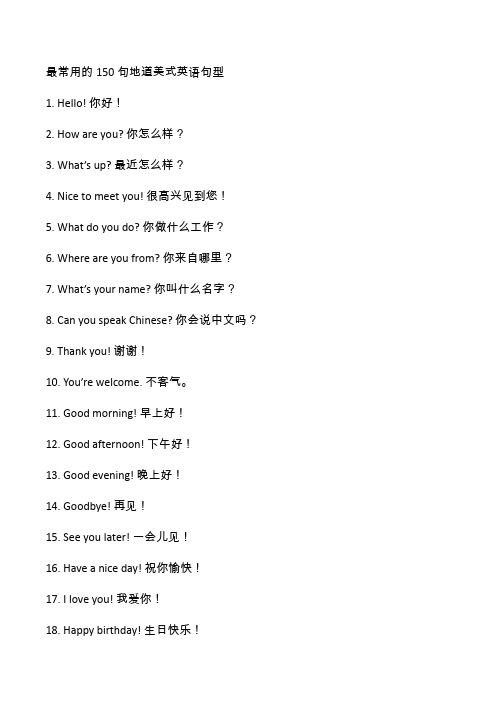
最常用的150句地道美式英语句型1. Hello! 你好!2. How are you? 你怎么样?3. What’s up? 最近怎么样?4. Nice to meet you! 很高兴见到您!5. What do you do? 你做什么工作?6. Where are you from? 你来自哪里?7. What’s your name? 你叫什么名字?8. Can you speak Chinese? 你会说中文吗?9. Thank you! 谢谢!10. You’re welcome. 不客气。
11. Good morning! 早上好!12. Good afternoon! 下午好!13. Good evening! 晚上好!14. Goodbye! 再见!15. See you later! 一会儿见!16. Have a nice day! 祝你愉快!17. I love you! 我爱你!18. Happy birthday! 生日快乐!19. Congratulations! 恭喜!20. I’m sorry. 对不起。
21. Excuse me. 对不起。
22. Could you repeat that, please? 能再说一遍吗?23. Can you help me? 你能帮我吗?24. I don’t understand. 我不明白。
25. What does that mean? 那是什么意思?26. How much is it? 这个多少钱?27. What time is it? 几点了?28. Do you have the time? 你有时间吗?29. Where is the bathroom? 厕所在哪里?30. Can I have a menu, please? 可以给我一份菜单吗?31. I would like to order. 我想要点餐。
英语十四个句型
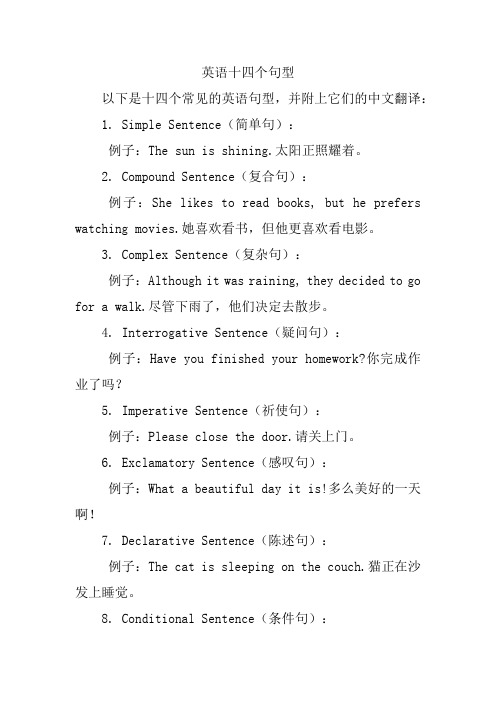
英语十四个句型以下是十四个常见的英语句型,并附上它们的中文翻译:1. Simple Sentence(简单句):例子:The sun is shining.太阳正照耀着。
2. Compound Sentence(复合句):例子:She likes to read books, but he prefers watching movies.她喜欢看书,但他更喜欢看电影。
3. Complex Sentence(复杂句):例子:Although it was raining, they decided to go for a walk.尽管下雨了,他们决定去散步。
4. Interrogative Sentence(疑问句):例子:Have you finished your homework?你完成作业了吗?5. Imperative Sentence(祈使句):例子:Please close the door.请关上门。
6. Exclamatory Sentence(感叹句):例子:What a beautiful day it is!多么美好的一天啊!7. Declarative Sentence(陈述句):例子:The cat is sleeping on the couch.猫正在沙发上睡觉。
8. Conditional Sentence(条件句):例子:If it rains, we will stay indoors.如果下雨,我们会呆在室内。
9. Passive Voice Sentence(被动语态句):例子:The cake was baked by Mary.蛋糕是玛丽烤的。
10. Direct Speech Sentence(直接引语句):例子:She said, "I will be there at 5 o'clock."她说:“我会在5点钟到那里。
- 1、下载文档前请自行甄别文档内容的完整性,平台不提供额外的编辑、内容补充、找答案等附加服务。
- 2、"仅部分预览"的文档,不可在线预览部分如存在完整性等问题,可反馈申请退款(可完整预览的文档不适用该条件!)。
- 3、如文档侵犯您的权益,请联系客服反馈,我们会尽快为您处理(人工客服工作时间:9:00-18:30)。
1. 关于……人们有不同的观点。一些人认为……
There are different opinions among people as to ____ .Some
people suggest that ____.
2. 俗话说(常言道)……,它是我们前辈的经历,但是,即使在今天,
8. 然而,正如任何事物都有好坏两个方面一样,……也有它的不利的一
面,象……。Test99
However, just like everything has both its good and bad
sides, ______also has its ownTest99的disadvantages, such as
[2]. Recently the issue of the problem of/the phenomenon of ...
has been brought into focus. ( has been brouth to public attention)
[3].Inflation/Corruption/Social inequality ... is yet another of
the /chart/bar graph/line/graph,it can be seen that______
while. Obviously,______,but why?
(二)中间段落句
1. 相反,有一些人赞成……,他们相信……,而且,他们认为……。
On the contrary,there are some people in favor of ___.At
more, _____.Most important of all,______.
4. 有几个可供我们采纳的方法。首先,我们可以……。Test99
There are several measures for us to adopt. First, we
can______
5. 面临……,我们应该采取一系列行之有效的方法来……。一方
in both arguements/statements , but (I tend to the profer/latter ...)
[3]. Now, it is commonly/generally/widely
believed/held/acknowledged
that .... They claim/believe/argue that ... But I wonder/doubt
会……。
It is high time that something was done about it. For
example. _____.In addition.Test99的_____.All these measures
will certainly______.
7. 为什么……?第一个原因是……;第二个原因是……;第三个原因
coming to realize/accept/(be aware) that...
[3]. Now there is a growing awareness/recognation ot the
necessity
to......
Now people become increasingly aware/conscious of the importance of
Nowhere in the world/China has the issue/idea of .. benn more visible/
popular than...
[2]. Now people in growing/significant numbers are beginnig/
4. 现在,……很普遍,许多人喜欢……,因为……,另外(而且)
……。
Nowadays,it is common to ______. Many people like ______
because ______. Test99的 Besides,______.
5. 任何事物都是有两面性,……也不例外。它既有有利的一面,也有不
[2]. When it comes to .... , some people bielive that .......
Others
argue/claim that the opposite/reverse is true . There is probably some
truth
the same time,they say____.
2. 但是,我认为这不是解决……的好方法,比如……。最糟糕的
是……。
But I dont think it is a very good way to solve ____.For
example,____.Worst ofTest99的all,___.
9. ……在我们的日常生活中起着越来越重要的作用,它给我们带来了许
多好处,但同时也引发一些严重的问题。
______ has been playing an increasingly important role in
our day-to-day life.it has Test99的 brought us a lot of
利的一面。
Everything has two sides and ______ is not an exception,it
has both advantages and disadvantages.
6. 关于……人们的观点各不相同,一些人认为(说)……,在他们看
来,…… 的
People’s opinions about ______ vary from person to person.
其次,……。更为糟糕的是……。
Today, ____, which have brought a lot of harms in our daily
life. First, ____ Second,____. What makes things worse is
that______.
whether.....
1-2 现象法 引出要剖析的现象或者问题, 然后评论 .
e.g
[1]. Recently the rise in problem of/(phenomenon of) ... has
cause/
aroused public/popular/wide/worldwide concern.
______.
9. 尽管如此,我相信……更有利。
Nonetheless, I believe that ______is more advantageous.
10. 完全同意……这种观点(陈述),主要理由如下:
I fully agree with the statement that ______ because______.
[2]."........." How often we hear such
statements/words like
1-1 对立法 : 先引出其他人的不同看法,然后提出自己的看法或者偏向于某一看法,适用于有争议性的主题.
例如(e.g)
[1]. When asked about....., the vast/overwhelming majority of
people
say that ....... But I think/view a bit differently.
the
new and bitter truth we have to learn to face now/constantly.
-----&
nbsp;To be continued !!
1-3 观点法 ----开门见山,直接了当地提出自己对要讨论的问题的看法.
e.g:
[1]. Never history has the change of .. been as evident as ...
......
[4]. Perhaps it is time to have a fresh look at the
attitude/idea
that.......
1-4 引用法 ----- 先引出名人名言或者有代表性的看法, 来引出文章要展开论述
的观点!
e.g:
[1]. "Knowledge is power." such is the remark made by Bacon.This
它在许多场合仍然适用。Test99
There is an old saying______. Its the experience of our
forefathers,however,it is correct in many cases even
today.
3. 现在,……,它们给我们的日常生活带来了许多危害。首先,……;
8. ……已成为人的关注的热门话题,特别是在年青人当中,将引发激烈
的辩论。
______ has become a hot topic among people,especially
among the young and heated debates are right on their way.
面……,另一方面,
Confronted with______,we should take a series of effective
